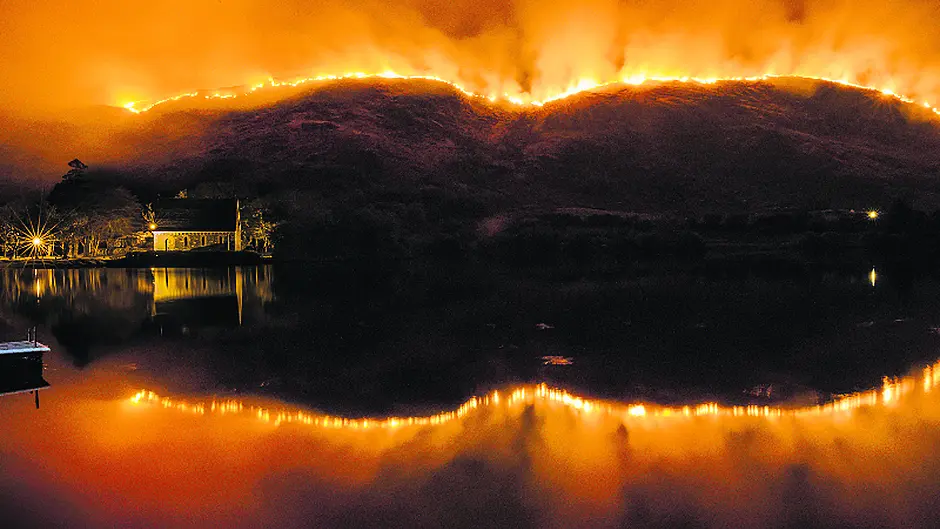Seven crews called in to battle biggest blaze in 26 years at Gougane Barra
Seven crews called in to battle biggest blaze in 26 years at Gougane Barra
BY JACKIE KEOGH
The largest gorse fire in Gougane Barra in 26 years burned an entire mountain at the weekend.
The fire – first reported to gardaí at 10pm on Saturday night, but not attended to by fire-fighting personnel until 24 hours later – came within 80m of a family home at the side of the picturesque lake.
Local hotelier Neil Lucey told The Southern Star that on the first night landowners at the other side of the mountain quickly moved their sheep and closely monitored the situation as it unfolded.
Mr Lucey said locals have no idea who started the fire, or why, but he believes it moved from Bailick, which is north of Gougane Barra, towards Carran, which is one of the high points on the Derrynasaggart mountain range.
On Sunday afternoon, he said, the fire on the mountain turned eastbound, after the wind changed, causing smoke to blow towards Gougane Barra.
‘By 7pm, the fire started coming in over the top, and by 8.30pm on Sunday there was a full ridge fire along the top of the mountain, stretching over 1km.’
Mr Lucey, who runs the popular hotel close to the world-famous St Finbarr’s Oratory, said the gardaí were contacted and they, in turn, contacted the Munster Regional Communications Centre (MRCC) in Limerick, which is responsible for the mobilisation of fire appliances and other agencies within the Munster region.
Aidan Glavin, assistant chief fire officer with Cork County Council, attended the fire in Gougane from 2am on Monday morning. He confirmed the fire service was not mobilised until 9.10pm on Sunday, April 23rd.
From early morning until late at night on Saturday, April 22nd, Mr Glavin said West Cork fire brigade crews had been attending gorse fires at Ahakista, Adrigole, Durrus, two gorse fires in Glengarriff, and one in Macroom.
Since Monday, the crews dealt with seven more gorse fires in West Cork, including one in Glenlough in Bantry, Oakmount in Castletownbere, Currakeal in Bantry, Durrus, Ballylickey, as well as another incident at Barnageeragh, and a gorse fire in Goleen.
‘Due to the dry spell and the increased rate of burning,’ Mr Glavin said, ‘it is taking up a significant amount of fire brigade man hours at this time of year, and can put the service under pressure.’
Since last Saturday morning, Cork County Council’s fire service has responded to a total of 23 gorse fires, as well as attending to three chimney fires and one ambulance assist.
Mr Glavin said: ‘We don’t have quantified details at this stage, but the level of activity in the last few days gives a clear indication of the demands that gorse fires are placing on the service.’
Although the fire at Gougane had already been burning for 24 hours, it was only after 9pm that it started moving quickly down the mountain and came within 80m of the home of Zeina Cronin and her son, Padraig, who had sheep on the mountain, but moved them in time to sheds.
Within a short time of being mobilised, there were three of the six West Cork districts, as well as Macroom, working as a single unit at Gougane Barra.
According to Mr Lucey, Macroom Fire Brigade worked to protect the Cronin’s home and livestock. He said: ‘They went up onto the mountain and quenched the fire, as well as hosing down the house and the sheds.’
The other three teams – Bantry, Dunmanway and Skibbereen – went into Gougane’s famous national forest park and set up separate centres, where they worked to back-burn the fire and protect the forestry.
According to Mr Lucey, a Ballingeary-based landscape photographer, Peter Cox, proved helpful in this regard by using his drone technology to pinpoint fires.
Mr Lucey said the crews were successful in their efforts to prevent the fire taking hold and only ‘a very small number of trees were damaged – about 10 or 15.’
By 7am on Monday morning, the fire was under control but the Dunmanway crew stayed on for a few more hours to put out hotspots – some of which re-ignited, but were quickly dealt with by the crew.
On Tuesday, Mr Lucey confirmed that some small hotspots on the mountain were still re-igniting, but there was ‘no danger’ because there was virtually nothing left on the mountain to burn.
He told The Southern Star that the last big fire in Gougane happened on the same weekend in 1991 – but that was ‘much smaller and much less destructive.’
Mr Lucey praised the West Cork fire fighting service saying: ‘The fact that it took seven fire units to deal with this gives you an indication of the enormity of the fire and the amount of resources that have to be put into dealing with a mountain fire.’









